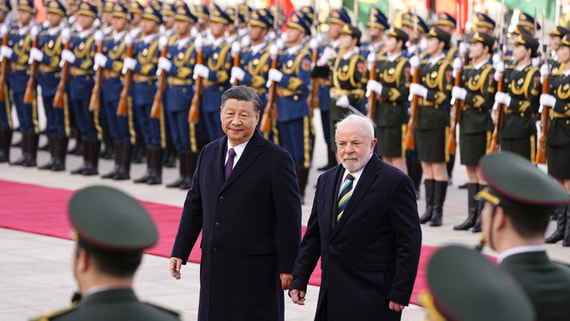Brazilian President Lula da Silva met with Xi Jinping in Beijing
[ad_1]

Brazilian President Luiz Inacio Lula da Silva met with Chinese President Xi Jinping on April 14 as part of a state visit to China (the country’s largest trading partner), according to the Chinese state agency Xinhua.
Both countries are part of the informal economic association BRICS (Brazil, Russia, China, India, South Africa). The slogan of the Chinese trip of the Brazilian leader was “liberation of developing countries from the yoke of the dollar”, cooperation in the field of technology, as well as the proposal of his own plan for resolving the conflict between Russia and Ukraine. Following the Brazilian President’s visit to China, Russia’s Foreign Minister Sergey Lavrov will visit Brazil on April 17.
As a result of the visit, according to the Brazilian TV channel Globo, 15 memorandums of understanding were signed. As previously announced on its website by the press service of the President of Brazil, the agreements include, in particular, the creation of the CBERS-6 satellite used to monitor the Amazon and the development of technologies for 5G telecommunications, the Internet and cybersecurity, agreements in the field of cooperation in agriculture and trade. The arrangements will also include joint research and development between public, private and academic institutions, as well as the exchange of scientists and scientific papers.
Previously, US authorities tried to prevent Brazil from buying 5G equipment from the telecommunications giant. Huawei (since 2019 has been under US export sanctions). On April 13, at the start of his visit, Lula da Silva visited a technology company’s research center in Shanghai.
According to SPbU professor Yana Leksyutina, Brazil’s cooperation with Huawei already has a long history. She notes that the Chinese company has been actively present in the Brazilian market since 2013, and the new agreements testify to the strength of cooperation and its deepening.
In addition, on April 13, at the inauguration ceremony of the new head of the BRICS Development Bank, Dilma Rousseff, in Shanghai, Lula da Silva announced the need to create an alternative currency to the dollar for settlements in international trade. Two weeks earlier, on March 30, Brazil and China reached an agreement on bilateral trade in yuan and also created a joint clearing system, which makes it possible to conduct cross-border transactions in the future without using the dollar.
The upward trend in the share of the yuan in global trade emerged in 2022. As reported by the Financial Times on April 12, 2023, based on data from the international interbank information transfer and payment system SWIFT, the share of transactions in yuan in cross-border transactions in February 2022, when Russia the beginning of the SVO in Ukraine, was 2%. By February 2023, it had increased to 4.5%.
The share of the dollar in world trade decreased by exactly the same 2.5%. In February 2022, 86.8% of trade settlements were carried out in it, and in February 2023 – already 84.3%. The share of the euro is 6% and does not change significantly. Experts interviewed by Vedomosti believed that, to a large extent, the increase in the share of the yuan in world trade was due to the “yuanization” of Russian exports against the backdrop of sanctions restrictions. But, they noted, countries in Southeast Asia, the Middle East and Latin America are increasingly starting to use the Chinese currency as an alternative to the US dollar.
China is Brazil’s main trading partner. In 2022, trade between the two countries reached a record $150.5 billion. In particular, China imported more than $89.7 billion worth of Brazilian products (mainly soybeans and ore). China has maintained the status of a priority trading partner for this Latin American country for 13 years.
Lula da Silva again became president in 2022 with the agenda of Brazil’s return to “big politics”, active participation in international affairs, global international problems. Among them are the settlement of the conflict in Ukraine (the President of Brazil did not criticize the PRC plan on this issue), and the idea of creating a single currency with Argentina, and technological development, says Dmitry Rozental, deputy director of the Institute of Latin America of the Russian Academy of Sciences.
He notes that Brazil’s economic cooperation with China has deepened in the previous decade, even despite the sometimes anti-Chinese rhetoric of Lula da Silva’s predecessor, right-wing President Jair Bolsonaro. Rosenthal agrees that settlements between Brazil and China in yuan are possible, given the significant trade turnover between the two countries and the fact that China is Brazil’s main trading partner.
In addition, according to the scientist, an additional factor in Brazil’s choice of the yuan for settlements was the fact that, following the results of 2022 and sanctions restrictions against Russia, and even earlier, Iran and a number of other countries, it became clear that transactions in dollars carry risks of tracking , and then blocking funds in dollars. China, on the other hand, has long invested heavily in Brazil, including in infrastructure, under the Belt and Road Initiative, and both sides have an interest in securing both current and future investments, Rosenthal concludes.
The agreement on the use of national currencies in trade, in this case the yuan, is in line with the current trend in developing countries to diversify instruments in their trading operations, Leksyutina said. China has been taking comprehensive measures to internationalize them since 2008, the expert notes, especially since Brazil attracts Beijing in many aspects, including, but not limited to, agricultural products, minerals and hydrocarbons.
“In addition, it is worth remembering that during Xi’s recent visit to Russia, Vladimir Putin indicated that the Russian Federation is ready to use the yuan in trade with third countries. It can be assumed that such use of the yuan may be in the Russian-Brazilian trade in the future,” the expert concludes.
[ad_2]
Source link








